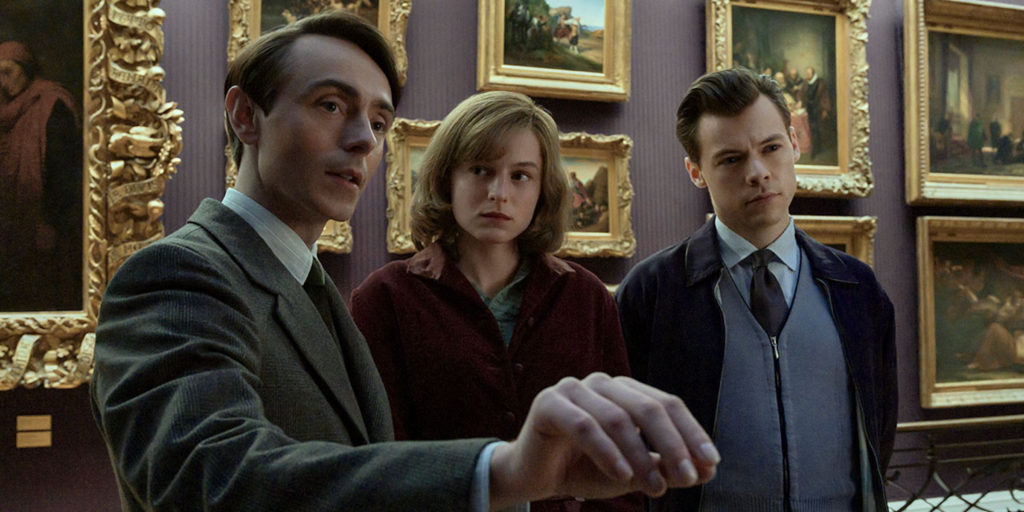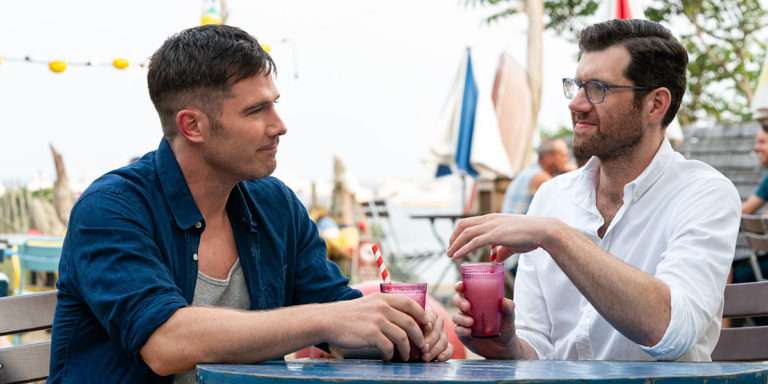Bros (2022 | USA | 115 Minutes | Nicholas Stoller)
After more than a century of mainstream romantic comedies, director Nicholas Stoller and writer/star Billy Eichner deliver the people at the multiplex the first mainstream, wide-release, gay romcom. There are certainly a series of qualifiers on that sentence to make it exactly true, but the Bros arrives the the fanfare of boundary-breaking even as it riffs on familiar character beats of some of the classics of the genre. Eschewing (and skewering) the Hallmark romances that made a name for hunky co-star Luke Macfarlane, the film nevertheless makes its best efforts to shed the trite “love is love” mantra and instead strives to portray an accurate and modern story of gay love (and lust).
Eichner plays a successful writer, podcaster, and director of a brand-new lgbtq+ history museum in NYC who’s a lifelong bachelor and vocal skeptic of romance (and happiness). His script delivers timely jokes at rapid fire, with most landing knowing laughs throughout a receptive audience at my afternoon screening. The afternoon encore may not have been a premiere, but it still had the feeling of an event. And even as the first iconoclastic hour of Grindr hookups, perpetual ghosting, and hilarious board meetings of representation politics give way to more familiar romcom beats (with a few modern twists), it’s still probably the first time a wide release features a holiday party that descends into awkward four-way sex scene about opening a relationship to non-monogamy.
After centuries of gay love stories being suppressed in popular culture (also a topic of Eichner’s character’s book, meta!), maybe this is exactly what the people have been clamoring to see splashed across summer multiplexes. Representation matters! Eichner and Stoller are aware that even in breaking some commercial grounds, theirs is still a story centered on cis-gendered white men who inhabit bodies with considerable lean muscle mass and minimal body fat, a fact that they acknowledge early and often with self-skewering jokes. It maybe goes on a little long, but is almost always a lot of self-referential, sweet, and often sexy fun. I enjoyed a lot of the movie so rather than complain about some of its excesses, I am respecting and holding space for the filmmaker’s artistic assertion that their comedy needed a two hour runtime, if only to forever recontextualize “Unforgettable” as a bedroom ballad and to squeeze in at least one crowd-pleasing musical number.

My Policeman (2022 | UK | 113 minutes | Michael Grandage)
First: yes, My Policeman does indeed rewards a decade of Tumblr teen fanfic longings with copious scenes of naked Harry Styles in the erotic embrace of another man. Second, can Harry act? Sure, he’s basically … fine here? Largely because the role — simple local lad in uniform who falls under the spell of a “lifelong bachelor” art curator while also pursuing an uncommonly chaste relationship with a mousy schoolteacher — doesn’t ask too much from him. But while that simplicity works in Styles’s favor, the lack of complexity prevents the film as a whole from elevating.
Aiming to be a prismatic story of deception, love, friendship and the consequences across the decades, My Policeman might be a candidate for the “gay trauma” wing of the museum that Billy Eichner’s character was opening in Bros. Adapted from Bethan Roberts’s novel, the film opens in the slightly-more-enlightened 1990s as retired schoolteacher played by Gina McKee (Marion, whose main hobbies include longing looks of silent resignation out the windows) has taken in an old friend (Rupert Everett, as stroke-impaired Patrick) against the vociferous protests of her retired policeman husband (Linus Roache, as Tom, an avid-walker of his little dog).
The history of the thirty year rift between this trio’s “well, it’s complicated” is unveiled in snippets of unreliable memory and diary entries. We first see Marion & Tom’s meeting through her sunny recollections, in which he and the early days of their relationship are filmed in idealized style. Later, she happens upon one of Patrick’s journals and the story of Patrick & Tom’s meeting unfolds: a chance meeting, an invitation to do some modeling, a drunken caress, and long stretches of deception. The younger versions of these characters hold most of the spotlight: Styles as Tom, Emma Corrin as Marion (in serious danger of being typecast as vibrant women fumbling into terrible marriages between this, the Crown, and Lady Chatterly’s Lover where at least they get to have some fun), and David Dawson eking some grace notes out of the tortured bon vivant Patrick. It’s 1950s England, where homosexuality was illegal. Their early outings on cultural expeditions immediately read as suspect to modern viewers, but there are hints of vibrance to be found as we see alternative sides of the affair and contrast the tasteful heat on one side with the dutiful couplings on the other. The irony of a copper lusting after a bloke is evident, though it’s reinforced by scenes of police harassment to set the stakes for each clandestine pairing.
Danger, repression, and clandestine romance are fertile territory for a doomed love story, but the more we learn about what Marion knew, when she knew, and what she did about it, the flimsier both the past and present day narrative feels. We’re left with the story of a tumultuous and passionate year of betrayal and regret, with no sense of the glue that held the intervening decades together. The past narrative may be riddled with tropes, but there are at least hints of life. As the present day storyline sputters toward a conclusion in a sad seaside cottage, it overreaches for resolution and muddles its way to an unearned sense of false uplift.
All images courtesy TIFF, where Bros and My Policeman had their World premieres; both will be released to a wider public later this year.



